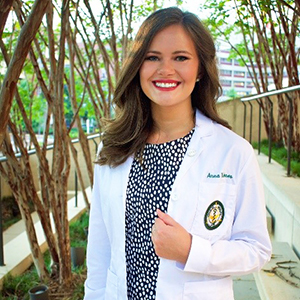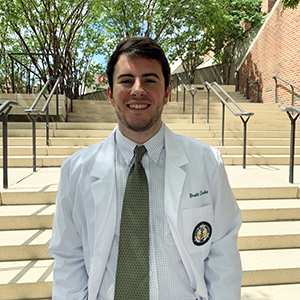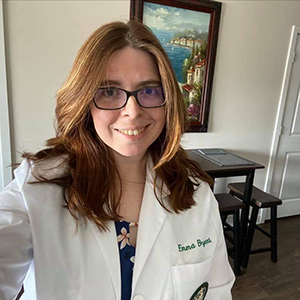As their first year of medical school comes to a close, our co-coordinators reached out to MS1s Anna, Brett, and Emma to chat about what this year has meant to them, what they’ve enjoyed the most, and how it has lived up to— or differed from—their expectations.

Anna Jones, Tuscaloosa campus
1. What surprised you the most about medical school?
The friendships that have been made! The friendships that you make in medical school are very deep. You don’t realize how close you can get with someone until you ride the struggle bus, lay on the floor of a Volker study room and nap with them, and take mid-day walks around campus as a study break with them. I can absolutely say that the friendships I’ve made in medical school will last forever.
2. What has been your favorite block so far and why?
My favorite block so far has absolutely been Pharmacology in fundamentals. I LOVED learning about autonomic drugs, and Dr. Wilborn is a queen (she's the block director and unbelievably sweet, kind, and intelligent). This was the block that we got to do our first simulation as well.
3. If you are a part of any of the special pathways offered (urban underserved, rural medicine, etc.), please describe what made you apply for that track.
I am in the Primary Care Track program. Being raised in a family that emphasized having a heart to serve others, I know that my career path in medicine will lead me in a direction where I can continue to passionately give back to my community. As a primary care physician, the opportunities to provide quality healthcare to underserved communities is limitless. Additionally, it is my desire to promote adequate patient education and engagement through improvement of patient health literacy. Primary care physicians are often the first to develop trusted physician-patient relationships, thus being extremely impactful in helping educate and engage patients with involvement in their health.
As I have personally observed and interacted with primary-care physicians caring for their patients, I have seen providers who practice compassionate, active listening at the optimal level. They treated patients respectfully, making an effort to develop patient rapport and establish physician-patient trust. The lessons and practices I learned from these physicians will be employed in my future career. Indeed, as community leaders, physicians need to address struggles of medically underserved populations and help overcome healthcare barriers these communities face. As an aspiring primary care physician desiring to serve a diverse patient population, it is imperative to respect all patients as individuals, and make an effort to enable patients of all backgrounds to feel confident in taking an active role in their healthcare.
4. Any plans for the summer?
I will be researching treatment rates and birth outcomes for syphilis in pregnancy in Africa. Our project is trying to identify a new treatment option for syphilis during pregnancy. The current first-line treatment (benzathine penicillin) is highly effective but it is not always available due to global stock outs and supply chain issues. My research mentor is Dr. Jodie Dionne-Odom.

Brett Cooke, Birmingham campus
1. How was the adjustment to medical school for you?
Before starting school, I heard the comparison that medical school is like "drinking water from a fire hose". It has definitely felt like that at times, especially at the beginning of school when I was still getting my footing. The key for me has been to make a plan and stick to a schedule. For example, I know that every day I want to get up, review the previous day's material, go over that day's lectures, and then review the new material. By having a standard list of tasks that I set for myself each day, it makes the day much more manageable! Another thing that helps me stay motivated is the fact we are all learning how to be great doctors in medical school instead of just taking basic science classes in undergrad (no more organic chemistry!).
2. What surprised you the most about medical school?
The faculty here at UAB is always happy to help you with anything you may need. This was a big difference for me compared to undergrad where I only talked to an administrator if I needed to register for classes. From Medical Student Services to your course directors, everyone is always happy to answer any questions that you have.
3. What has been your favorite block so far and why?
My favorite block has been our cardiovascular block. It is the first organ system module that you will have after finishing fundamentals, and I think it is a really interesting block to begin the new semester with. The course directors are very involved, and they host review sessions throughout the entire block.
4. What are some of the ways you have gotten involved with UABSOM?
I have gotten involved in a couple of different ways. During orientation, you will be assigned your learning community. These are groups that you will do various activities with throughout the year ranging from having medical ethics discussions to having fun socials. I really like event planning, so I became a representative for my learning community. I am also going to be an orientation leader for you this fall! At UAB, there are a lot of different interest groups for medical specialties, and I have gotten involved in a couple of these groups as well.
5. Any plans for the summer?
I am going to be doing clinical research in cardiothoracic surgery! There are numerous different research fellowships you can apply for as an MS1, and the School of Medicine is very helpful in guiding you through the process. There are faculty mentors in all specialties that you may be interested in here at UAB that would be happy for you to get involved in their research.

Emma Bryant, Huntsville campus
1. How was the adjustment to medical school for you?
Medical school was definitely an adjustment. As someone who likes having a Plan A, B, C, and D, I had to learn to take things day by day. Not a very easy thing to learn, but it's best for my mental health. I did find that the structure of going to classes (on Zoom during COVID) helped provide some much needed structure to my day.
2. What has been your favorite block and why?
My favorite block was Micro, at the end of the fall semester. Even though there's a lot of material to cover in only three weeks, Drs. Lee and Patel make the lectures super entertaining. Plus they incorporated a Kaizen game to help you stay on top of the material and Winter Break was immediately after the final.
3. What are some of the ways you have gotten involved with UABSOM?
As a nontraditional student, it was really important to me to get involved with Admissions. When I was applying to medical schools, I found there wasn't a lot of advice for older students who were leaving established careers to pursue a career in medicine. After matriculating, I wanted to be available to provide insight and guidance for my fellow non-traditional applicants.
4. If you could tell yourself anything before you matriculated, what would you say?
Take medical school one day at a time and use Fundamentals to find your own way of studying. What worked for you previously may not work now, and it's completely normal to go through several iterations trying to find what works for you. Also, utilize your resources. MSS (Medical Student Services) is there for a reason. They're extremely approachable and genuinely want to help you succeed.
5. Any plans for the summer?
Reading for fun instead of for studying. My Tailored Book Recommendations (TBR) has been growing all year. I also found a research mentor, so I'll be doing some research over the summer as well. Currently trying to define my project, but I'm looking forward to applying some of the knowledge I've learned this year in the lab.